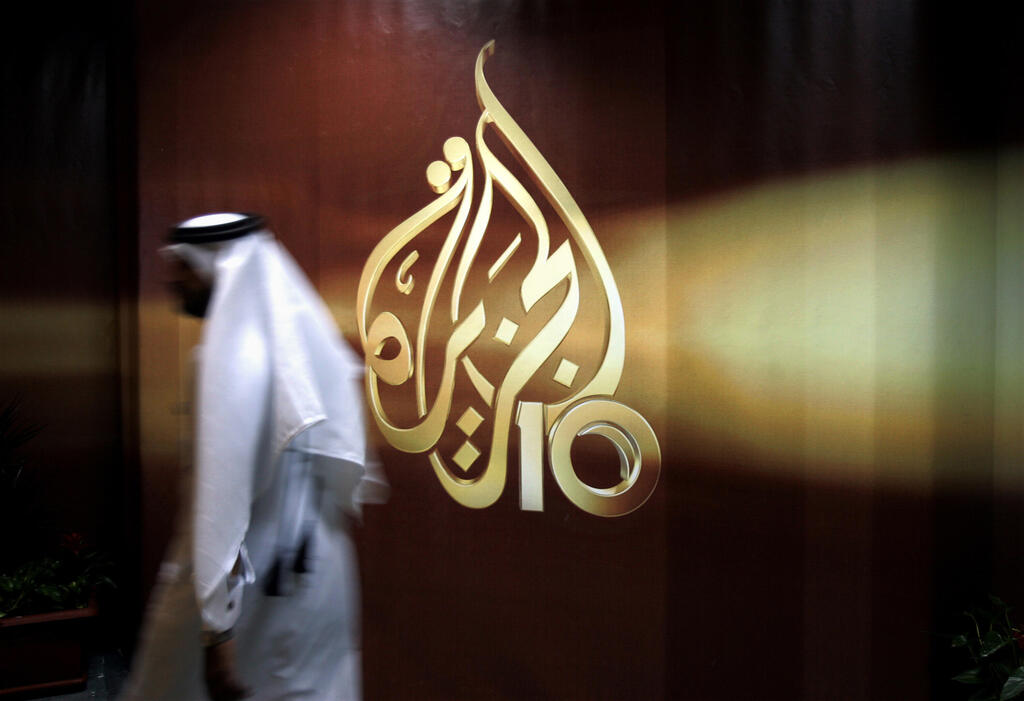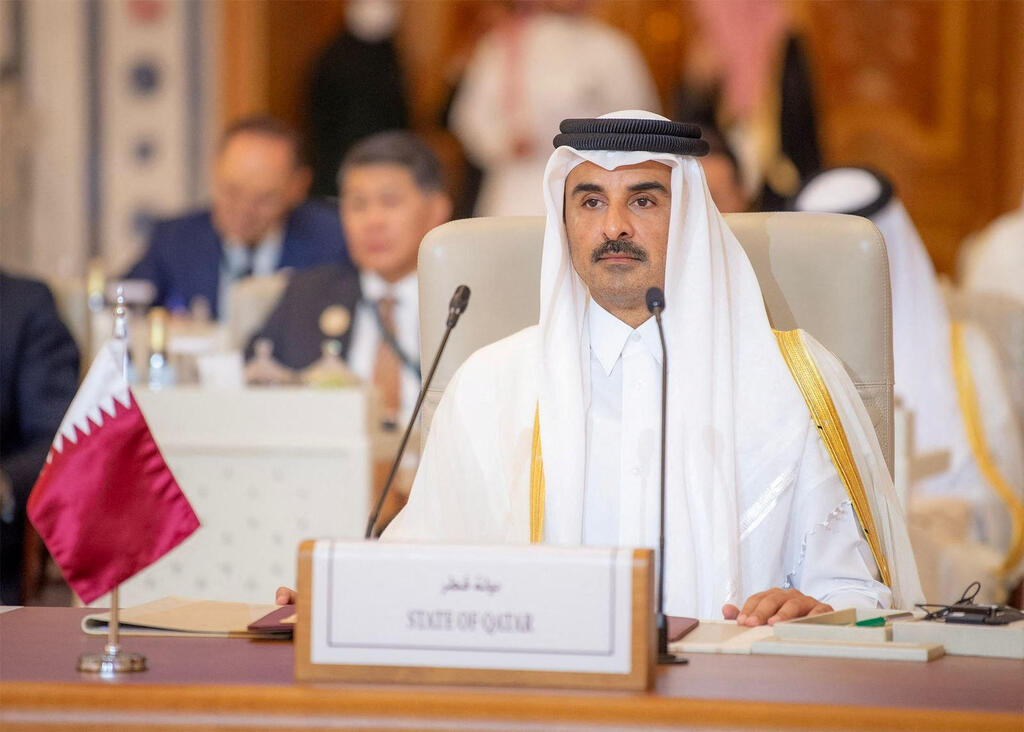Getting your Trinity Audio player ready...
The sixth U.S.-Qatar strategic dialogue held Tuesday in Washington was overshadowed by Qatar’s role in financing Hamas terrorism, and its state-owned Al Jazeera network’s promotion of the movement’s war against Israel.
2 View gallery


A Qatari employee of Al Jazeera Arabic language TV news channel walks past the logo of Al Jazeera in Doha, Qatar
(Photo: Kamran Jebreili / File / AP)
While Qatar bragged about Round 6 of the dialogue on its various state-owned outlets and foreign ministry website, the U.S. State Department did not promote the event on its own website. Secretary of State Antony Blinken shared a photo from his meeting with the Qatari ambassador Meshal Al-Thani in the context of the dialogue, although his post focused only on the mediation efforts related to Gaza rather than U.S.-Qatar strategic cooperation.
Qatar has repeatedly stressed its position as a regional player able to mediate between conflicting players, one of the few parties with a direct line to Hamas leadership. It is also home to a number of the leaders of the U.S. and EU-sanctioned terrorist movement Hamas, including political chiefs Ismail Haniyeh and Khaled Mashal.
It has therefore had a leading role in talks to secure a cease-fire and hostage release in Gaza, and families of some of the Israeli hostages have even visited Doha in recent months, as well as Israel’s spy chief David Barnea.
A statement released later by the State Department added that “the Secretary reiterated the United States’ support for a pathway to a Palestinian state with security guarantees for Israel,” underscoring the Biden administration’s recent openness about recognizing a future Palestinian state.
With regards to the Washington-Doha alliance, the statement concluded, “They reaffirmed the strength of the U.S.-Qatar relationship and the importance of continuing to work closely on shared strategic priorities to promote security and prosperity in the Gulf and broader Middle East region and beyond, as well as to foster ties between our peoples.”
It cannot be ignored that the strategic priorities are upheld by the presence of CENTCOM’s largest airbase in the Middle East, Al-Udaid. Hosting thousands of American troops, it has served as a protective shield for the ruling Al-Thani family since it was built in 1996, with continuous U.S. administrations proving unwilling to use it as leverage to pressure the regime to desist its malign activities.
For instance, Qatar’s authoritarian regime pumped over $2 billion into the coffers of Hamas over the last decade, in the form of suitcases of cash delivered by an envoy to pay salaries in Gaza. While serving the apparent purpose of stabilizing Gaza's economy and preventing a social crisis, a good percentage of the Qatari funding was used to build Hamas’s vast underground terrorism tunnel system that is being uncovered and destroyed by the Israeli army in the current war.
Likewise, Qatar has engaged in serious violations against its supposed ally, the U.S. Yigal Carmon, the founder and president of Middle East Media Research Institute (MEMRI) and the former counter-terrorism advisor to Israel Prime Ministers Yitzhak Shamir and Yitzhak Rabin, which has extensively researched Qatari terror financing, pointed to the emirate’s spying on U.S. Congress members.
More stories:
Carmon stressed that “Due to this criminal violation of American sovereignty and laws, this Qatari ambassador should be recalled by his brother, the emir of Qatar, or through a firm request from the U.S. Congress or government.”
In addition to its malign activity targeting lawmakers, Qatar’s media arm has also escaped scrutiny. As Carmon pointed out, “Qatar defies the U.S. Department of Justice requirement that Qatar's tool, Al Jazeera TV, register as a foreign agent in accordance with the Foreign Agents Registration Act (FARA) laws.” MEMRI recently published a deep-dive report on the Qatari-owned network and how it helps promote the regime's agenda.
Carmon, who speaks fluent Arabic and is a leading expert on the Arab world, wrote in MEMRI’s report on Al Jazeera that the network “carries out its foreign policy by means of indoctrination of the Arabic-speaking masses worldwide. Al Jazeera, therefore, should not be discussed as a means of telecommunications, but instead as an unyielding and forceful political tool of Qatari foreign policy under the guise of a mass media network.”
According to the report, “Al Jazeera's ‘official’ role in the Hamas-Israel War is nowhere more evident than in its exclusive broadcast of Hamas military commander Mohammed Deif on the morning of Saturday, October 7, at the very time that Hamas terrorists were carrying out their mega-terror attack in Israel, killing over 1,200 and taking more than 250 Israelis and foreign nationals hostage into Gaza.”
MEMRI continued: “In the recording, Deif declared the launch of 'Operation Al-Aqsa Flood' and warned that this was just the ‘first strike’ of the operation. He incited all Palestinians – in the West Bank, in Jerusalem, and within Israel itself – to join the war, using all the means in their possession – guns, knives, Molotov cocktails, and vehicles.”
Al Jazeera journalists themselves have been revealed to be working directly for Hamas in Gaza, evidence of Hamas's infiltration into all professions in Gaza and its institutions. Israel has also accused Al Jazeera of disseminating propaganda, and the government has taken steps toward shutting the Jerusalem bureau.
In the wide-ranging report, Carmon also introduced a new analysis of the radical brand of Islamism that animates the Al-Thani family that rules over the tiny oil-rich Gulf country. “Qatar is a Wahhabi-Muslim Brotherhood extremist entity in the guise of a supposedly modern nation-state. Wahhabism is an 18th-century movement espousing a return to 7th-century Islam, including uniting the Muslim world under the banner of Jihad," wrote Carmon.
According to Carmon, Qatar promotes its Wahhabi doctrine with a 3-pronged approach: funding Islamist terrorist organizations worldwide (foremost among them, Hamas). Secondly, trying to topple secular authoritarian regimes in the Arab-Muslim world under the guise of fighting dictatorships (as it did in Egypt in 2012). And third, using its vast oil wealth to pay for educational, social, religious and political movements around the world to expand its influence (as can be seen in its many sponsorship schemes with Western universities and sports teams).
Al Jazeera has served as one of Qatar’s most powerful public relations arms in both the Arabic and English-speaking worlds, and helps promote Qatar’s two-faced nature. Launched the same year as the Al-Udaid base was built, the network truly became a household name in the aftermath of 9/11, when it was the only channel to air all of Al-Qaeda leader Osama Bin Laden's addresses and statements to the Arab world. It then grew into a multi-language operation with over 70 bureaus around the world, according to its website.
Qatar’s two faces, according to Carmon, are “its authentic identity as a Wahhabi and Muslim Brotherhood state, which it presents to the Arab and Muslim world, and a façade, which it presents to the Western world, to cover up its true identity. The Al Jazeera network embodies the same dichotomy: its Arabic channel presents its authentic nature to the Arab and Muslim world, but it presents a different façade to the English-speaking world.”
Numerous i24NEWS press queries sent to Qatar’s embassies in Washington and London to respond to the MEMRI report and whether Al Jazeera supports Islamic terrorism. No comments were received.



